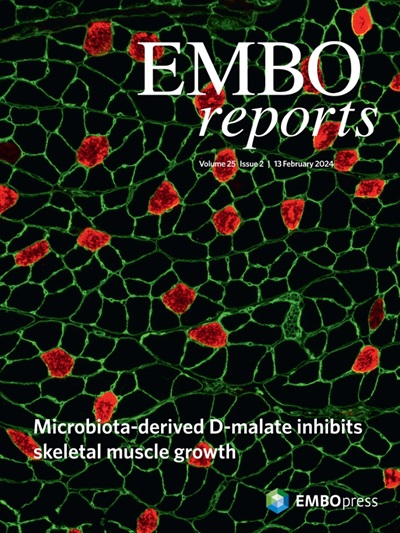Amplified centrosomes-more than just a threat.
IF 6.5
1区 生物学
Q1 BIOCHEMISTRY & MOLECULAR BIOLOGY
引用次数: 0
Abstract
Centrosomes are major organizing components of the tubulin-based cytoskeleton. In recent years, we have gained extensive knowledge about their structure, biogenesis, and function from single cells, cell-cell interactions to tissue homeostasis, including their role in human diseases. Centrosome abnormalities are linked to, among others primary microcephaly, birth defects, ciliopathies, and tumorigenesis. Centrosome amplification, a state where two or more centrosomes are present in the G1 phase of the cell cycle, correlates in cancer with karyotype alterations, clinical aggressiveness, and lymph node metastasis. However, amplified centrosomes also appear in healthy tissues and, independent of their established role, in multi-ciliation. One example is the liver where hepatocytes carry amplified centrosomes owing to whole-genome duplication events during organogenesis. More recently, amplified centrosomes have been found in neuronal progenitors and several cell types of hematopoietic origin in which they enhance cellular effector functions. These findings suggest that extra centrosomes do not necessarily pose a risk for genome integrity and are harnessed for physiological processes. Here, we compare established and emerging 'non-canonical functions' of amplified centrosomes in cancerous and somatic cells and discuss their role in cellular physiology.扩增的中心体--不仅仅是威胁
中心体是基于微管蛋白的细胞骨架的主要组织成分。近年来,我们对中心体的结构、生物发生和功能(从单细胞、细胞间相互作用到组织稳态),包括它们在人类疾病中的作用有了广泛的了解。中心体异常与原发性小头畸形、出生缺陷、纤毛疾病和肿瘤发生等有关。中心体扩增是指细胞周期的 G1 阶段出现两个或两个以上的中心体,在癌症中与核型改变、临床侵袭性和淋巴结转移有关。然而,扩增的中心体也会出现在健康组织中,而且与它们的既定作用无关,也会出现在多重和解中。其中一个例子是肝脏,由于器官形成过程中的全基因组复制事件,肝细胞携带扩增的中心体。最近,在神经元祖细胞和几种造血细胞类型中也发现了扩增的中心体,它们增强了细胞的效应功能。这些发现表明,多余的中心体并不一定会对基因组的完整性构成风险,它们还可用于生理过程。在这里,我们比较了癌细胞和体细胞中扩增的中心体的既有和新出现的 "非规范功能",并讨论了它们在细胞生理学中的作用。
本文章由计算机程序翻译,如有差异,请以英文原文为准。
求助全文
约1分钟内获得全文
求助全文
来源期刊

EMBO Reports
生物-生化与分子生物学
CiteScore
11.20
自引率
1.30%
发文量
267
审稿时长
1 months
期刊介绍:
EMBO Reports is a scientific journal that specializes in publishing research articles in the fields of molecular biology, cell biology, and developmental biology. The journal is known for its commitment to publishing high-quality, impactful research that provides novel physiological and functional insights. These insights are expected to be supported by robust evidence, with independent lines of inquiry validating the findings.
The journal's scope includes both long and short-format papers, catering to different types of research contributions. It values studies that:
Communicate major findings: Articles that report significant discoveries or advancements in the understanding of biological processes at the molecular, cellular, and developmental levels.
Confirm important findings: Research that validates or supports existing knowledge in the field, reinforcing the reliability of previous studies.
Refute prominent claims: Studies that challenge or disprove widely accepted ideas or hypotheses in the biosciences, contributing to the correction and evolution of scientific understanding.
Present null data: Papers that report negative results or findings that do not support a particular hypothesis, which are crucial for the scientific process as they help to refine or redirect research efforts.
EMBO Reports is dedicated to maintaining high standards of scientific rigor and integrity, ensuring that the research it publishes contributes meaningfully to the advancement of knowledge in the life sciences. By covering a broad spectrum of topics and encouraging the publication of both positive and negative results, the journal plays a vital role in promoting a comprehensive and balanced view of scientific inquiry.
 求助内容:
求助内容: 应助结果提醒方式:
应助结果提醒方式:


